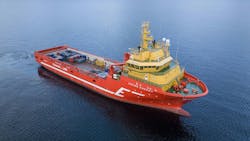Norwegian Offshore Platform Ship Vessel Converting to Ammonia Fuel in '26
Finnish power equipment firm Wärtsilä will supply the engine and fuel supply systems for a Norwegian offshore platform vessel which is being converted to run on ammonia.
Ship owner Eidesvik and Wärtsilä call this project the world’s first ammonia-fuel retrofit project for an offshore platform supply vessel. Named Viking Energy, the vessel is currently contracted to work for Norwegian-based energy producer Equinor and will be converted from fossil fuels to ammonia to cut greenhouse gas emissions 100%.
Viking Energy is scheduled to be converted in early 2026 and operational in the second quarter that year. Equinor will help finance the conversion, while Wärtsilä will deliver the engine, fuel gas supply system and exhaust after-treatment equipment.
Ammonia, like hydrogen, does not contain carbon in its molecular chain nor emits carbon dioxide when combusted. Like hydrogen, it is created through electrolysis that splits water molecules into hydrogen and oxygen, or produced by steam reforming of methane gas—the more carbon intensive method.
Once completed, Viking Energy is expected to become the world’s first ammonia-fueled in-service ship. Globally, commercial and industrial shipping burns heavy fuel oil, marine gas oil or natural gas, emitting close to 1 billion metric tons of carbon dioxide annually.
“In just 25 years—the lifetime of a single vessel—shipping needs to get to net zero emissions,” Håkan Agnevall, President and CEO of Wärtsilä, said in a statement. “Achieving this will require coordinated action by all maritime industry stakeholders to bring about the system change needed to accept a new generation of sustainable fuels.”
Wärtsilä and Eidesvik have collaborated on several industry decarbonization projects in recent years. One of those was developing a liquified natural gas-powered platform supply vessel.
“Close collaboration throughout the value chain is key to succeeding in the green transition,” Eidesvik Offshore CEO Gitte Gard Talmo said.
The latest partnership around the ammonia conversion for Viking Energy is part of the Apollo project co-founded by the Horizon Europe program. The funding program aims for a climate-neutral Europe by 2050.
The U.S. shipping industry also is studying the potential decarbonizing impact of ammonia in the fuel chain. The American Bureau of Shipping, CALAMCO, Fleet Management Limited, Sumitomo Corp., and TOTE Services jointly signed a memorandum of understanding (MOU) to conduct a feasibility study for ammonia.
About the Author
Rod Walton, EnergyTech Managing Editor
Managing Editor
For EnergyTech editorial inquiries, please contact Managing Editor Rod Walton at [email protected].
Rod Walton has spent 17 years covering the energy industry as a newspaper and trade journalist. He formerly was energy writer and business editor at the Tulsa World. Later, he spent six years covering the electricity power sector for Pennwell and Clarion Events. He joined Endeavor and EnergyTech in November 2021.
Walton earned his Bachelors degree in journalism from the University of Oklahoma. His career stops include the Moore American, Bartlesville Examiner-Enterprise, Wagoner Tribune and Tulsa World.
EnergyTech is focused on the mission critical and large-scale energy users and their sustainability and resiliency goals. These include the commercial and industrial sectors, as well as the military, universities, data centers and microgrids. The C&I sectors together account for close to 30 percent of greenhouse gas emissions in the U.S.
He was named Managing Editor for Microgrid Knowledge and EnergyTech starting July 1, 2023
Many large-scale energy users such as Fortune 500 companies, and mission-critical users such as military bases, universities, healthcare facilities, public safety and data centers, shifting their energy priorities to reach net-zero carbon goals within the coming decades. These include plans for renewable energy power purchase agreements, but also on-site resiliency projects such as microgrids, combined heat and power, rooftop solar, energy storage, digitalization and building efficiency upgrades.

